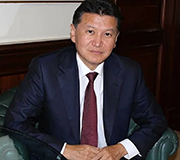No answer. The older generation keeps silent. The years in exile, and under KGB interrogation have taught them to stick tenaciously to the old refrain: I don't know, I saw nothing, I don't remember.
"I don't know". Just three words. At the same time "I know" means so very much; that is what my grandmother used to say. Our father's generation, who endured exile, KGB questioning and a lot more besides, have trained themselves to remember nothing so as not to betray. No dates, no cases, no names!
This was how the history of the Kalmyk people became depleted and the chain of generations was broken. And this link of sorrow can never be fully restored ...
At school, I am put in charge of political information for my year. There is so much that I want to understand about life; a life at once simple and complicated. I ask questions and get no answers. I feel that there is a mystery behind that silence. Should one trust official newscasts or hearsay?
The older generation has betrayed us. They have cast us out into the turbulent sea of life, a life rent apart by contradictions, without teaching us first how to swim. We have found ourselves floundering like blind kittens. Only the strongest will reach the shore. Give us a hand, somebody! But no hand is offered.
Okay, who cares! We'll sort things out after a while. l become an avid reader, a veritable book-worm, devouring philosophy, history, psychology. Perhaps these books will give me an answer? I develop a passion for physics, chemistry, and mathematics. These disciplines are devoid of lies, they are logical and clear. I wish to understand the world, its forces, laws and secret springs.
Everything is a mystery, but I like mysteries, they arouse my interest. I read a textbook: "... the law-abiding nature of the history of social development ..." If there is such a thing as a law-abiding nature, there must also be a law. Why is there no such law in effect in, say, Japan or the USA? Why i n this country alone? And what does "the role of an individual in history" mean? How can the law-abiding nature of social development co-exist with the cult of personality?
I study volumes from the "Lives of Outstanding Individuals" series thoroughly . What motivated these people? How did they feel? What did they long for? Why did they do what they did, regardless of what people around them thought? I compare myself with these heroes: could I replicate their courage? Could I imitate their actions? Could I resist all the pressure?
Kirsan Ilyumzhinov
The President's Crown of Thorns 1995
 On TV, Brezhnev kisses foreigners every day. The big shots openly steal and then go on binges at their Party dachas, and the entire population gets drunk year after year. The level of morality in the nation has dropped to zero.
On TV, Brezhnev kisses foreigners every day. The big shots openly steal and then go on binges at their Party dachas, and the entire population gets drunk year after year. The level of morality in the nation has dropped to zero.






















